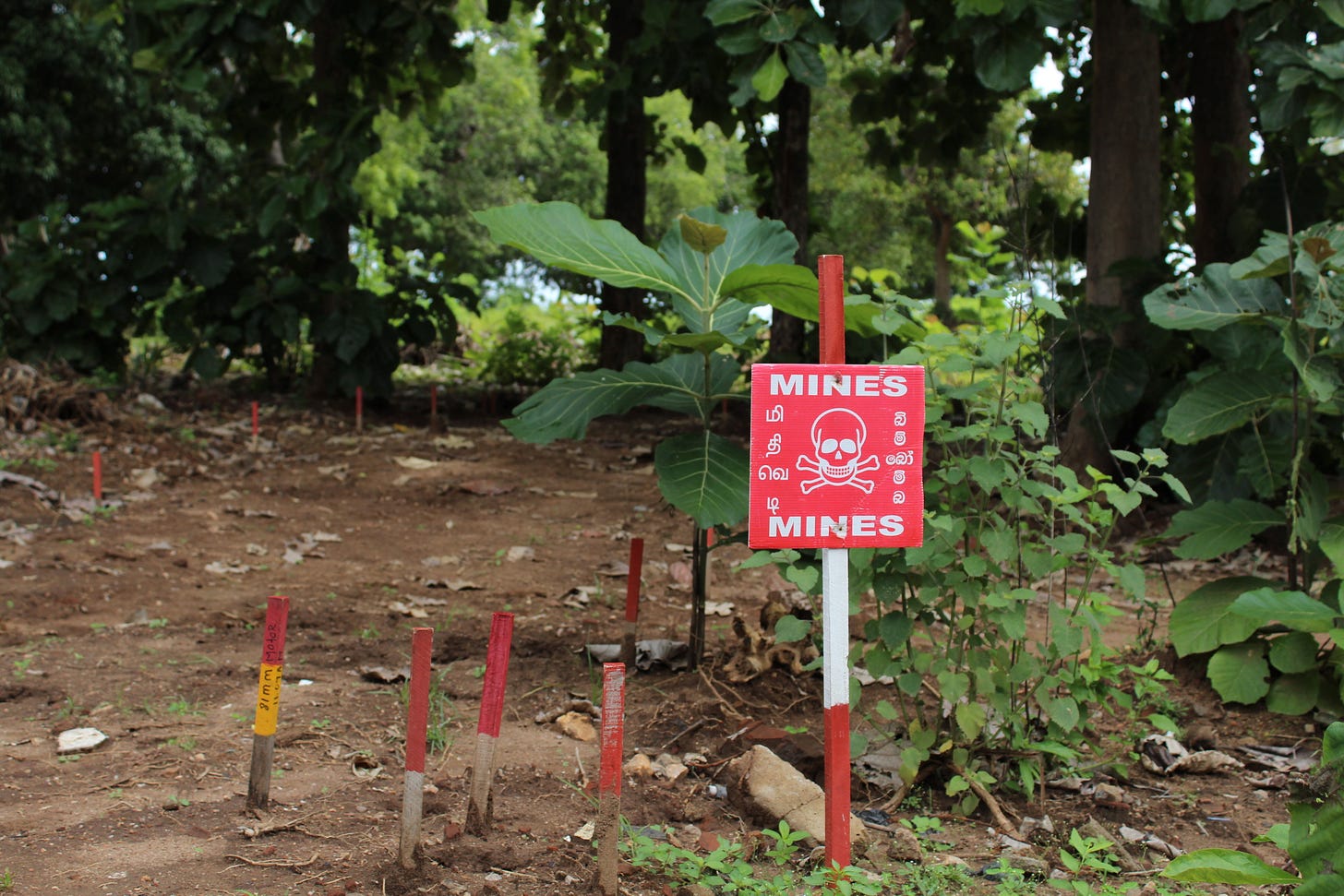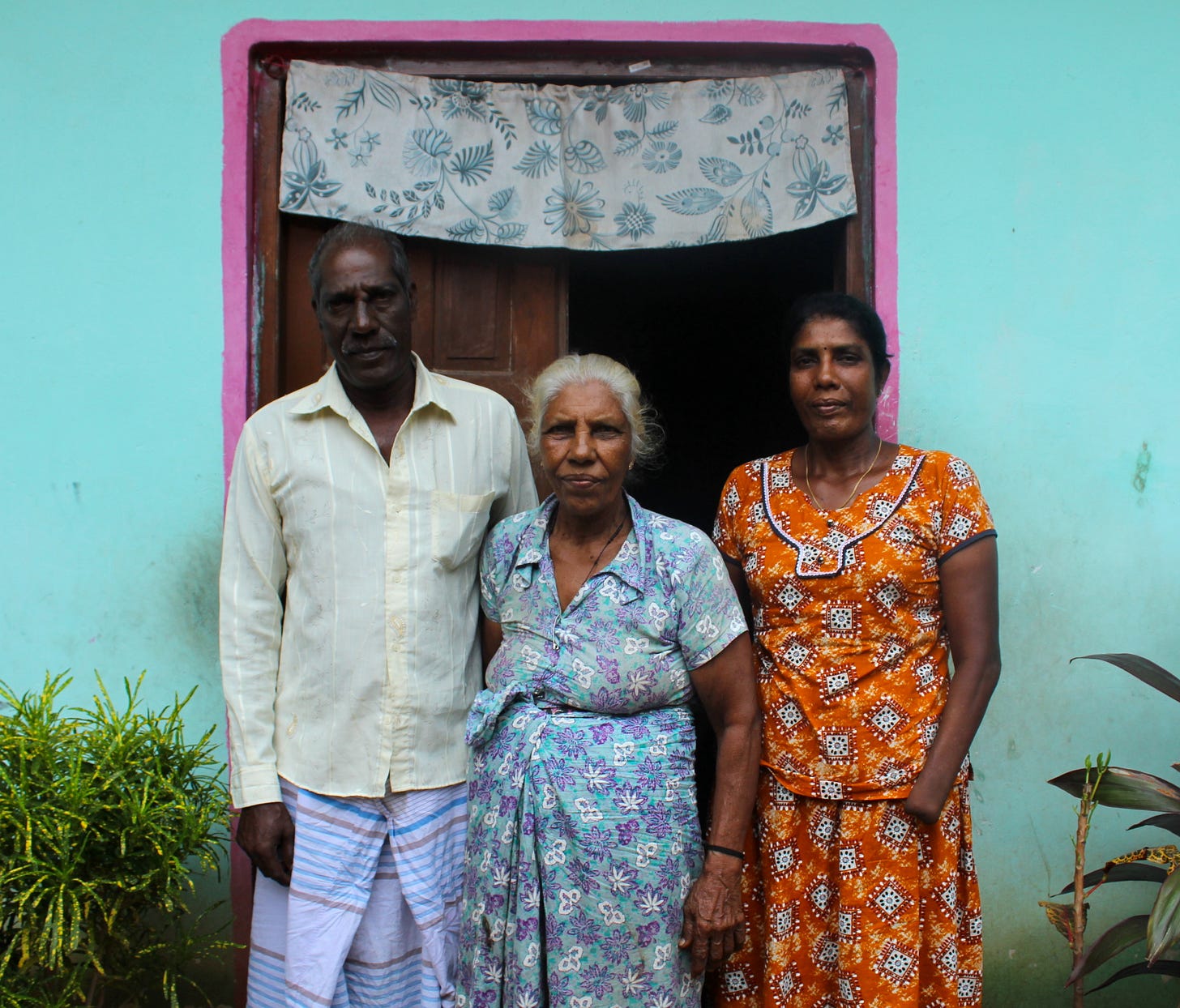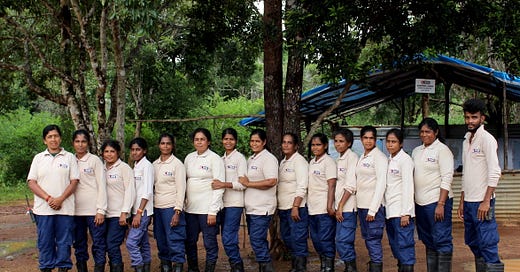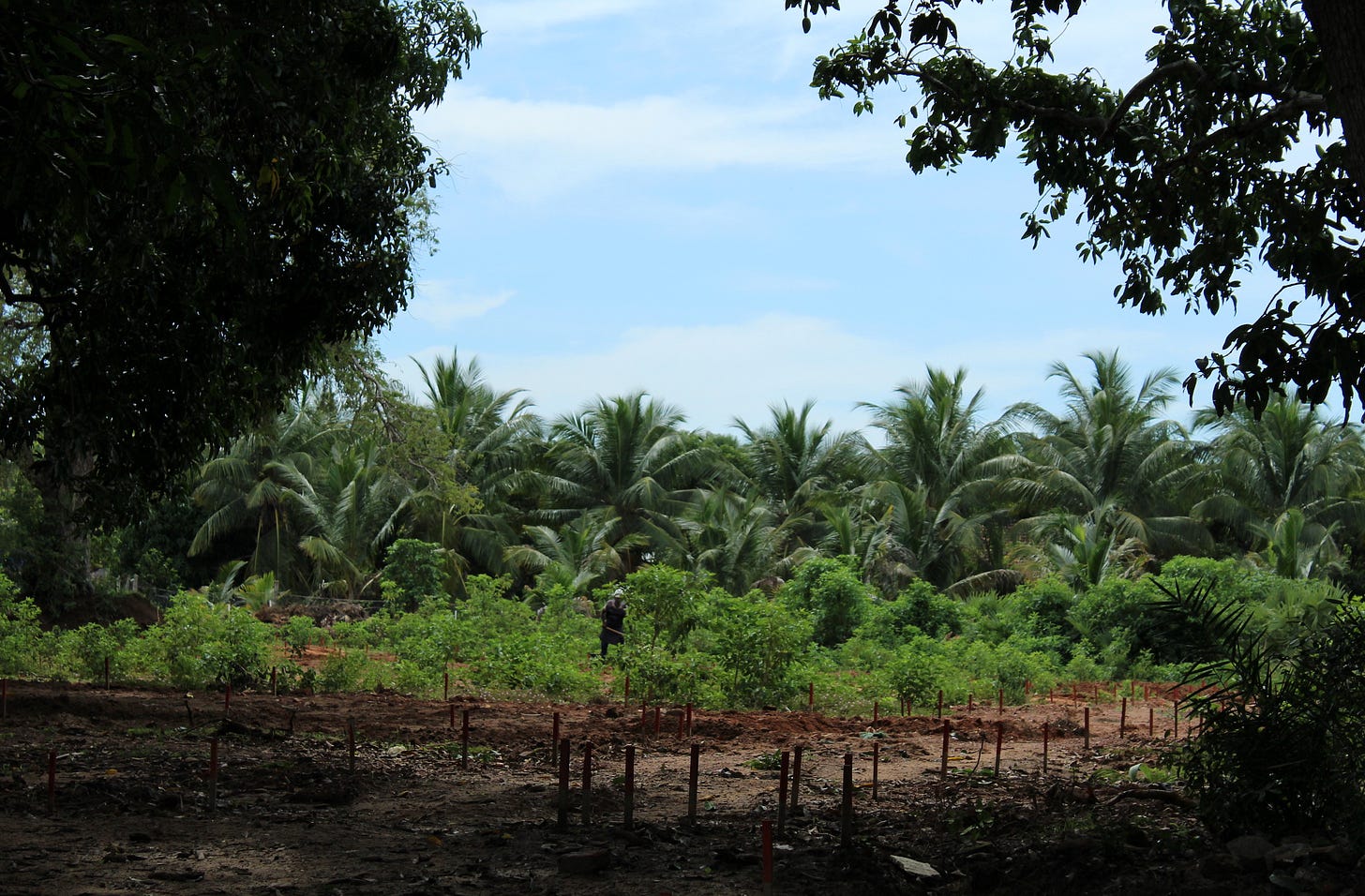Below is an extract from my piece for New Lines Magazine on the courageous women I met in Sri Lanka who are clearing landmines in the northeast for the Mines Advisory Group (MAG). Sri Lanka is known as the pearl of the Indian Ocean, not only because it was once a major source of pearls but also for its picturesque beaches, abundant wildlife and verdant tea plantations - making it a prime holiday destination. But the idyllic island nation is also wrestling with a dark past. The country’s 26-year civil war ended 15 years ago, and yet the scars remain raw - both on the land and on people’s psyches.
I first came across MAG in Lebanon in 2020, where I reported on their lifesaving work in communities along the country’s southern border with Israel. Many of those towns and villages have now been severely damaged or completely destroyed by Israeli bombardment - adding another layer, yet again, of unexploded ordnance, also known as UXO. Meanwhile, UXO in Gaza is a huge problem with at least 10% of bombs dropped by Israel remaining unexploded (approx 7,500 metric tons). Landmines and UXO are a deadly legacy, which will continue harming civilians long after the wars have ended.
Ravikumar Thamil Selvi remembers running through the forest carrying her 4-year-old daughter in her arms. It was 2009, at the brutal culmination of 26 years of civil war in Sri Lanka. Then 21 years old, Thamil Selvi and her husband were running for their lives after the Sri Lankan army launched an attack on the Liberation Tigers of Tamil Eelam (LTTE) separatist group near their village, Theravil, in the north of the island. They were heading for Mullivaikkal, a town a few hours’ walk away on the eastern coast, along with others who were fleeing. Artillery and shells exploded around them, “shattering people into pieces,” recalls Thamil Selvi. Some people died on the way. Others lost their limbs. When she turned back to make sure her husband was still with her, she realized he was gone.
“He was missing, but we had to keep moving to get to an [internally displaced persons] camp. I had to protect my daughter, so I suppressed my emotions and ran for my life to save my child,” she says. “Until this day, I don’t know what happened to my husband,” she continues, tears rolling down her cheeks. After the war, she searched everywhere for him and asked the Sri Lankan government, the army and humanitarian organizations to help her find him. It was only in 2020 that then-President Gotabaya Rajapaksa — who was defence secretary during the war — acknowledged for the first time that all those missing were dead. Until then, many families had held on to the hope that their loved ones could still be alive.
The civil war in Sri Lanka had a devastating impact across society. An estimated 89,000 women were made widows as a result of the war and are now the sole breadwinners for their families. Yet this need to keep their families going in the face of injury, displacement and loss has resulted in certain opportunities for the women and positive developments for the country.

“Demining has been a great leveler of the playing field for women in northern and eastern Sri Lanka,” says Cristy McLennan, the former Sri Lanka country director of the Mines Advisory Group (MAG), a global charity dedicated to clearing land mines in postconflict areas. Of their 660 deminers in Sri Lanka, 153 are women, often working in all-female teams, playing a key role in the clearing of these indiscriminate weapons. Another international demining charity, HALO, has 1,200 Sri Lankan staff, 40% of whom are women.
The work simultaneously provides a stable source of income for the women and enables communities to return safely to their homes and develop their livelihoods, once the land is clear for farming and living. It also gives the workers a sense of comradeship and a strength in unity. The question is: Can this help them, and the country, to heal? Many Tamils in the northeast still feel a burning sense of injustice, 15 years on from the end of the bloody conflict. They believe that there has been a lack of accountability from the government and that much more still needs to be done. It is not only the country's land that bears the scars of war.
The war was fought between the government — dominated by the Sinhalese ethnic majority — and minority Tamil rebels who sought to create an independent state in the north. The rebels saw this as the only answer to systemic anti-Tamil discrimination and marginalization, which had culminated in the Black July pogrom of 1983, when Sinhalese mobs killed between 400 and 3,000 Tamils, raped indiscriminately and destroyed Tamil businesses. This was the catalyst for the civil war. Beginning soon after, the fighting killed an estimated 100,000 people and left about 20,000, mostly Tamils, missing. In the early 1990s, a series of suicide bomb attacks by the LTTE killed both Sri Lanka's President Ranasinghe Premadasa and the Indian Prime Minister Rajiv Gandhi. A ceasefire was agreed in 2002, but it broke down in 2006. The war entered its final stages in 2009, during which fighting intensified, war crimes were committed by both sides and government forces declared a military victory.
Photos and videos from the end of the war showed prisoners with their hands tied behind their backs being executed by government forces, while corpses of female fighters were left with their clothes torn off, apparently after being raped. Sexual violence was widespread and systematic, and happened to both men and women.
The scars of the war remain etched on the land as well as on people’s psyches. An estimated 1.6 million land mines were left unmarked in the ground, contaminating swaths of land, mainly in the north and east — predominantly Tamil areas — where fighting was most intense. Land mines were laid by both the LTTE and the Sri Lankan army to defend territory and are still being found to this day in forests, on farmland and in residential areas. They are notoriously indiscriminate weapons which can kill and maim civilians — particularly children, who often mistake them for toys — long after wars have ended. The use, stockpiling and transfer of antipersonnel land mines was banned in 1997 under the Ottawa Convention, yet they are still being used today in conflicts around the world.
Thamil Selvi, now 36, is a small woman with a delicacy that belies her strength. For a decade, she has worked as a deminer for MAG. Every day, she gets up at 2 a.m. to cook and clean before catching a 5 a.m. bus to a minefield, where she dons a helmet and heavy personal protective equipment to search for mines and other unexploded ordnance in the ground. This is an arduous task, which involves using a metal detector to identify objects or a long rake to painstakingly comb through the soil, allowing mines to be exposed from the side rather than the top, thereby avoiding detonation. This is a method unique to Sri Lanka, forced on the country because of the sheer quantity of metal contamination, including metal that is not from mines; metal detectors are triggered so often that their efficiency for mine clearance is reduced. Often, the terrain is uneven and filled with dense vegetation, which needs to be cleared, while temperatures soar to 95 F (35 C). At 1:30 p.m., their work ends and, by 4 p.m., she is back at home.
During a break at a minefield in Munudru-Murippu, a village in Mullaitivu district in the northeast, Thamil Selvi says she sank into depression following the war, when she was living in a camp for displaced people. “My future was blurry, I didn’t know what to do next. I lost all my senses, but little by little I was able to stand on my feet again.” Her work as a deminer helped her do this — not only by creating financial stability but also by building a camaraderie between her and the women she works alongside. She describes them as a “united family,” adding: “Everyone treats me gently, with a lot of love and affection. I am much happier and livelier when I’m in the minefield — my personality comes out.”
These women risk their lives every day to clear the land, which is then given back to the local community so people can return to their homes, farm their land or simply live without fear. But they also share a solidarity which is evident in the way they interact with one another. “We have a sisterhood,” says Shashikumar Ketharagowri, 45, who has been working at MAG for 10 years, first as a deminer and now as a team leader, managing 12 others. I see her joking around with them during their break. “During stand down, we take it in turns to go round to each other’s homes to cook and eat together.” I meet her in the middle of a forest in Vengalachattikulam in Vavuniya district. As a resident of the nearby Periyathampanai village, she sees her work as being “like a social service.” She adds that they also provide clear economic benefits to people’s lives. “Very recently, we released 4 acres of land and the owners almost immediately started cultivating lentils.” This is crucial as the country recovers from the economic collapse that hit in 2022, after years of overspending, causing rampant food and fuel shortages and, ultimately, a political crisis.
This camaraderie helps women live with the social stigmas they face. “Living as a single mother is a major challenge for women in the north and east, but if we concentrate on what others think about us then it is not going to help our lives,” Ketharagowri says. When her husband left her and their two children, she had to find a stable income quickly. Clearing land mines was her answer. “I don’t really care what others think of me, I am a self-sufficient woman.” She adds that most women in the north and east share the same resolute strength: “Since we have gone through a very gruesome 30-year war, we are able to do anything.”
The demining work helps all the women provide for their own families. Thamil Selvi’s daughter is now 20 and dreams of becoming a fashion designer. With her income from demining, Thamil Selvi is able to pay the 10,000 rupees ($33) for her tailoring classes. “With all the difficulties in the field as a deminer and the sorrow of not having my partner and not knowing what happened to him, my biggest compensation in life is realizing the dream of my daughter and seeing her happiness,” she says.
Read the full piece here.

Reading:
My Brain Finally Broke - Jia Tolentino writes in The New Yorker about the brain fog that’s recently descended on her (and many others), and how her grasp of reality seems to be slipping away:
“I suspect that the opaque feeling in my head can also be traced to a craven instinct: it’s easier to retreat from the concept of reality than to acknowledge that the things in the news are real.”
The Furies: Three women and their violent fight for justice - I’ve only just started reading this book by Elizabeth Flock, but it’s brilliant (and rage-inducing). From Brittany Smith in Alabama who shot dead her rapist, to Angoori Dahariya in India who is leading a female vigilante gang protecting victims of domestic abuse, to Cicek Mustafa Zibo, a Kurdish woman who fought in an all-female militia against ISIS in Syria, Flock chronicles how these women took justice into their own hands when the police, governments, and courts failed to protect them.
Are we heading for another world war or has it already started? - An interesting - and deeply worrying - analysis by The Guardian’s diplomatic editor on the current state of flux in geopolitics. “From Kashmir to Khan Younis, Hodeidah, Port Sudan and Kursk, the only sound is of explosions, and the only lesson is that the old rules no longer apply.”
Writing:
‘We’re ready to fight’: activists brace as US anti-rights figures descend on Africa - For The Guardian, I interviewed activists and health workers in Africa who are bracing themselves for an influx of some of the most powerful, ultra-conservative campaigners from the US and Europe over the coming months.
The prominent campaigners, who all oppose abortion, transgender and LGBTQ+ rights, and are against sexuality education, are due to speak at a series of conferences in Kenya, Uganda, Rwanda, and Sierra Leone, focused on African “family values” and “national sovereignty”.
Activists told me they fear their work will become much more difficult at a time when the second Trump term has supercharged a “freefall” of rights globally.
Nelly Munyasia, director of Reproductive Health Network Kenya (RHNK), says there is nothing African about the agenda being pushed under the guise of family values. “They claim it is African, and yet it’s not African. Africa values are pegged on love and living together as a community.
“They are perpetrators of hate,” she says, with their anti-abortion stance “predisposing women to death”.
Across the region, activists are mobilising to counter the idea that African cultural values are under threat, as suggested by the anti-rights movement, and expose it for what it is: an attempt to maintain colonial-era laws that, in Ramatu Bangura's words, “were never in the interest of our people in our communities”.
“We’re ready for a battle; we’re ready to fight, and we understand what the stakes are,” says Bangura, who is co-chief executive at Purposeful, a hub for girls’ activism in Sierra Leone. “These forces that are coming into our country from outside are designed to take us back to a colonial era that we’re not interested in going back to.”
Thanks for reading. Until next time!





Saw your post thought this might resonate - I serve the song beneath the traps—the bass that bombings couldn’t own. https://thehiddenclinic.substack.com/p/what-i-found-in-the-smoke-that-the